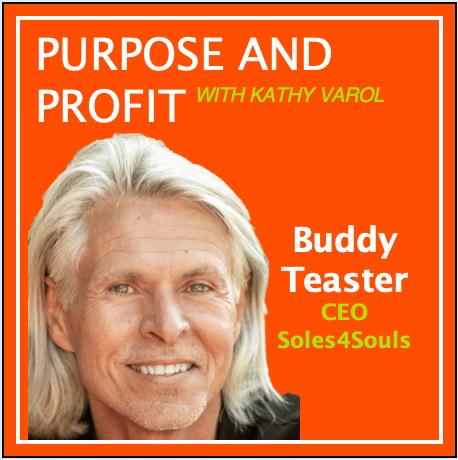Show Notes:
Buddy is President & CEO at Soles4Souls, a not-for-profit social enterprise creating opportunity through the collection and distribution of shoes and clothing around the world. Teaster’s experience at Soles4Souls, along with the organization’s global economic impact, is chronicled in his book, shoestrings: how your donated shoes and clothes help people pull themselves out of poverty.
Previously, Buddy was President of StarKart and the National Association of Local Advertisers, and served as Chief Network Officer for the nonprofit Young Presidents’ Organization. In 2012 he joined Soles4Souls to rebuild the organization after a period of leadership turmoil.
In this episode we discuss:
✅ How to regain trust after it’s been lost
✅ The surprising impact new shoes have on kids experiencing homelessness
✅ The business case for partnering with Soles4Souls (from my adidas days)
3 episode takeaways (listen to the full episode for a lot more gems!):
1️⃣ One important pathway of impact Soles4Souls uses is to foster economic empowerment by supplying micro-enterprises with gently used shoes and clothing. There is a strong case for using this approach to alleviate poverty, versus giving products away.
While giving products away is important during times of crisis, poverty is a systemic issue and therefore requires a systemic solution. Some academic research points to evidence that free donations can flood a market, ruining demand for local businesses. As Michael Matheson Miller, the director of PovertyCure says, “When you give away something free, you’re giving away a band-aid. You’re not addressing deeper causes of poverty and you may be inhibiting long-term solutions. Poor people aren’t poor because they lack stuff; they’re poor because they lack the infrastructure to create wealth.” This is an important distinction that explains why supporting economic empowerment is so powerful.
***
2️⃣ Dignity is a powerful word. Each person deserves to be treated with dignity.
It’s important to keep that word front and center when helping others, and when seeking help ourselves. Each of us will be on the receiving and the giving end of help countless times throughout our lives. Too often the foundation of dignity is lost when the numbers of need exceed our ability to imagine the individual. In these cases, emotion gets lost and is replaced with efficiency. But it’s acting on the foundation of dignity that keeps humanity on both sides of the equation. It’s a standard worth holding ourselves accountable to in every interaction.
***
3️⃣ As consumers, it’s important for each of us to take accountability for the lifecycle of the products we consume. It takes time and energy to sort and recycle items. It takes time and energy to drop off your old clothing and shoes at a donation center, instead of throwing them away. It’s these small acts of time and energy that are needed from each one of us to enable a circular economy.
A circular economy is a model of production and consumption, which involves sharing, leasing, reusing, repairing, refurbishing, and recycling existing materials and products as long as possible—keeping the material out of landfills and letting material be repurposed for a second life.
***
Have you ever considered joining a not-for-profit board?
Buddy thinks you should—it’s an amazing opportunity to have an impact. Do your homework. Look for a company and CEO you believe in, someone you can see yourself working for the long haul. Go into it knowing there will be commitments of time and expense. “But you can have a big impact,” Buddy says. “To take it seriously as a business person, it will make you better. Not just because you’re giving back. That’s the wrong reason to do it. It will make you better. You can do that as a business person while having an impact at the same time. There’s no trade off.”
References:
- Connect with Buddy on LinkedIn
- Soles4Souls
- Learn more here about how you can contribute to the Soles4Souls mission
- shoestrings: how your donated shoes and clothes help people pull themselves out of poverty by Buddy Teaster
- For deeper insight into how charitable donations may impact economic development, I recommend “The One-for-one Business Model: Avoiding Unintended Consequences”, Knowledge at Wharton, February 16, 2015.

